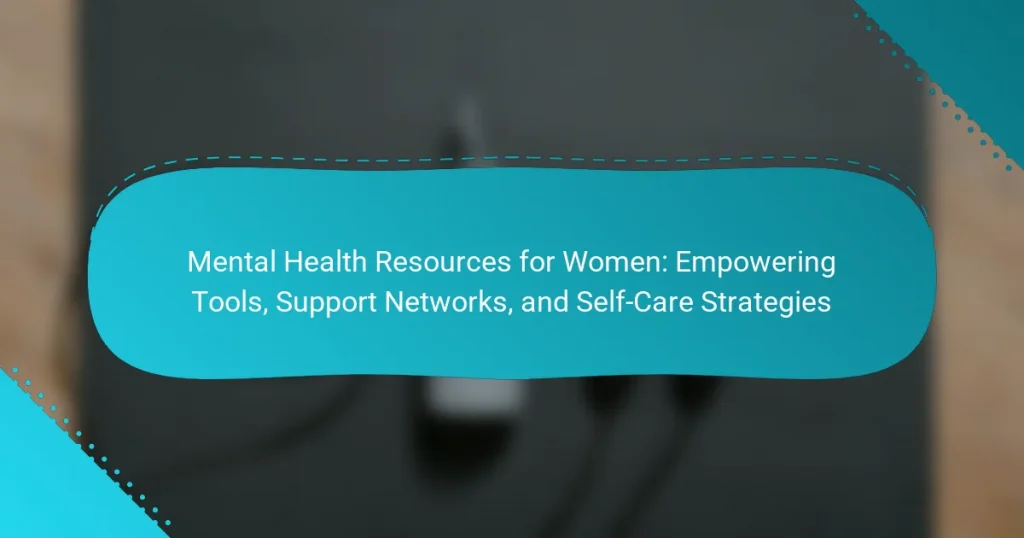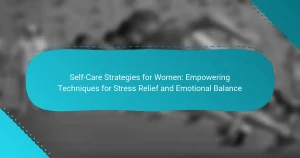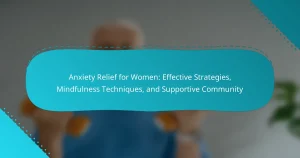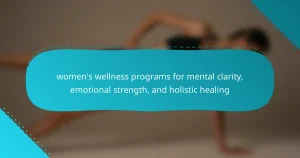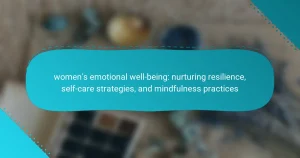Mental health resources for women are essential for effective emotional well-being. This article explores therapy services tailored for unique challenges, supportive community networks, accessible online platforms, and practical self-care strategies. By understanding these tools, women can enhance their mental health and build resilience. Engaging with specialized resources empowers women to prioritize their mental well-being and foster supportive connections.
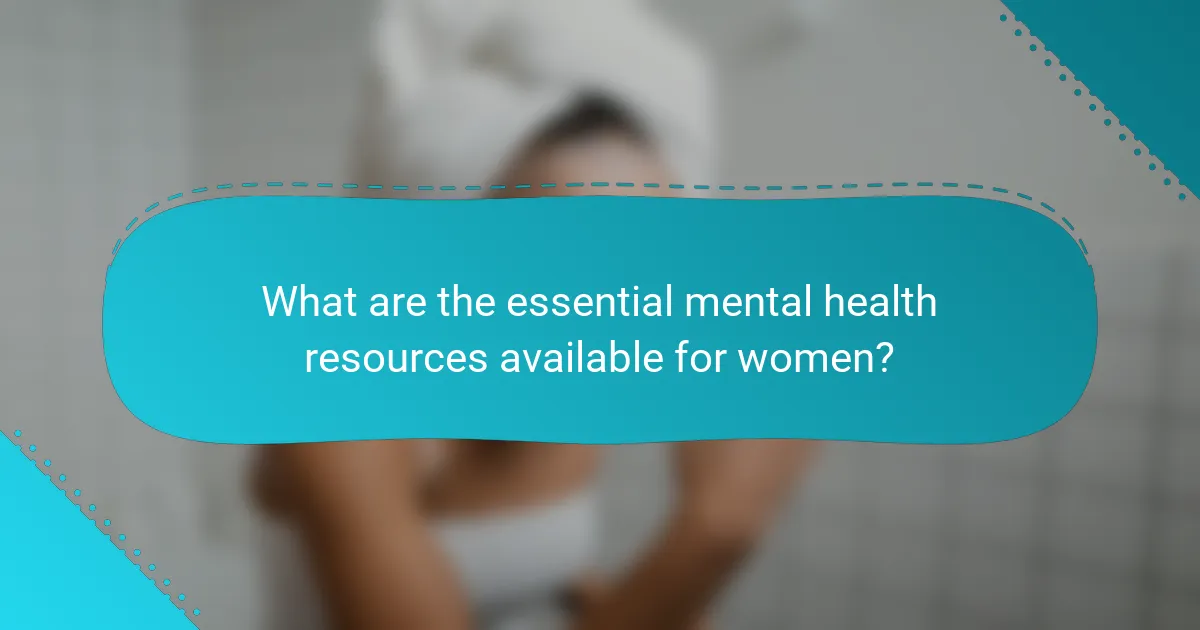
What are the essential mental health resources available for women?
Mental health resources for women include therapy services, support groups, online platforms, and self-care tools. These resources empower women to manage their mental well-being effectively.
Therapy services provide personalized support, addressing unique challenges women face, such as postpartum depression and anxiety. Support groups foster community, allowing women to share experiences and coping strategies. Online platforms offer accessible information and virtual consultations, ensuring help is available anytime. Self-care tools, like mindfulness apps, promote daily mental health practices.
Research shows that women are more likely to seek mental health support than men, highlighting the importance of tailored resources. These essential tools and networks create a supportive environment for women’s mental health empowerment.
How do support networks impact women’s mental health?
Support networks significantly enhance women’s mental health by providing emotional support, reducing feelings of isolation, and fostering resilience. These networks can include friends, family, or professional groups that offer understanding and encouragement. Research indicates that women with strong support systems experience lower levels of anxiety and depression. Additionally, these networks facilitate access to mental health resources, promoting proactive self-care strategies.
What types of support groups are most beneficial?
Support groups that focus on specific issues, such as anxiety, depression, or trauma, are most beneficial for women. These groups provide shared experiences, emotional support, and coping strategies. Peer-led groups often foster a sense of community and belonging. Research shows that women in supportive environments report improved mental health outcomes. Additionally, online support groups expand accessibility, allowing women to connect regardless of location.
How can online communities provide support?
Online communities offer vital support by fostering connection, sharing resources, and providing encouragement. They create safe spaces for women to discuss mental health challenges, share personal experiences, and access valuable tools. Studies show that participation in these communities can enhance emotional well-being and reduce feelings of isolation. Additionally, online platforms often host support groups and workshops, which empower women with self-care strategies and coping mechanisms. This unique attribute of accessibility allows members to engage with others and find support at their convenience.
What self-care strategies are effective for women?
Effective self-care strategies for women include mindfulness practices, physical activity, social support, and setting boundaries. Mindfulness techniques, such as meditation and journaling, enhance emotional awareness and reduce stress. Regular physical activity, like yoga or walking, improves mood and overall health. Building a strong social support network provides emotional resilience and companionship. Lastly, establishing personal boundaries fosters better mental well-being and prevents burnout.
Which self-care practices promote emotional well-being?
Self-care practices that promote emotional well-being include mindfulness, physical activity, and social connections. Engaging in mindfulness can reduce stress and enhance emotional regulation. Regular physical activity boosts mood and increases energy levels. Building social connections provides support and fosters a sense of belonging, which is crucial for mental health. Prioritizing these practices empowers women to cultivate resilience and improve overall emotional well-being.
How can physical activity enhance mental health?
Regular physical activity significantly enhances mental health by reducing symptoms of anxiety and depression. Engaging in exercise releases endorphins, which improve mood and increase feelings of well-being. Studies indicate that women who participate in physical activity experience greater emotional resilience and stress management. Additionally, group fitness classes foster social connections, providing essential support networks that empower women in their mental health journeys.
What are the universal benefits of mental health resources for women?
Mental health resources for women provide essential support, enhancing overall well-being. These resources improve emotional resilience, foster community connections, and promote self-care practices.
Access to mental health services leads to increased awareness of mental health issues, reducing stigma. Women benefit from tailored programs addressing unique challenges, such as postpartum depression or anxiety.
Support networks, including peer groups and online forums, offer safe spaces for sharing experiences. These connections encourage vulnerability and healing, empowering women to prioritize their mental health.
Self-care strategies, such as mindfulness and stress management techniques, enhance coping skills. Women who engage in these practices report improved mental clarity and emotional stability.
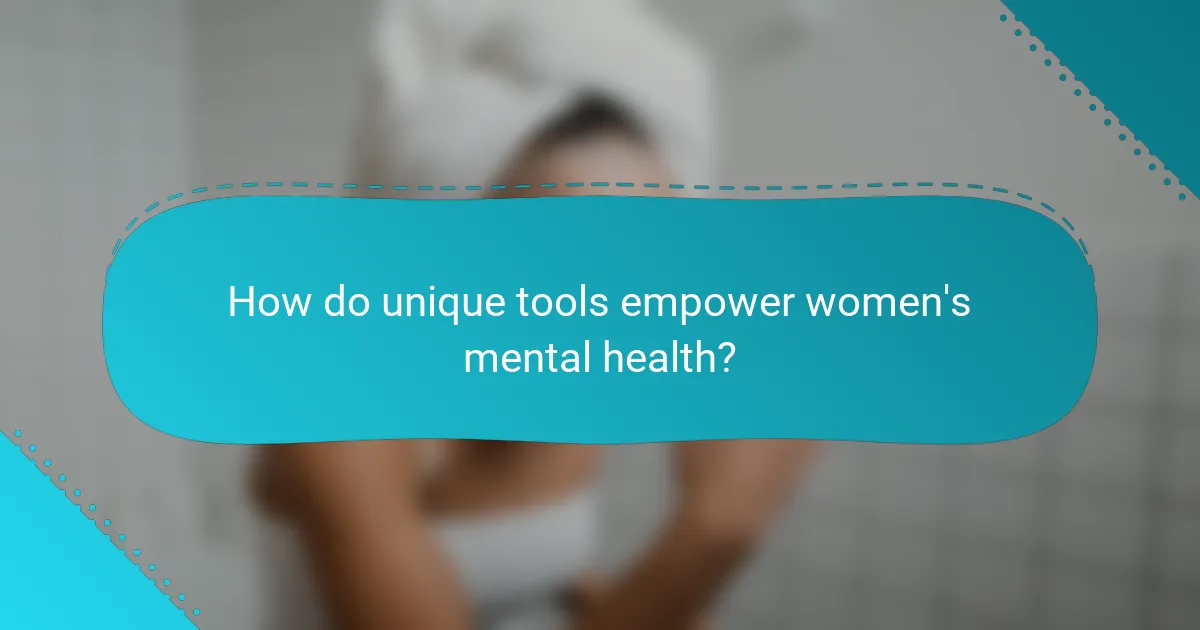
How do unique tools empower women’s mental health?
Unique tools enhance women’s mental health by providing tailored support and resources. These tools include apps, online communities, and workshops that focus on mental well-being. For instance, mental health apps offer personalized strategies for stress management, while support networks foster connection and shared experiences. Research shows that women who engage with these resources report improved emotional resilience and coping skills. Additionally, self-care strategies, such as mindfulness practices, empower women to prioritize their mental health effectively.
What role do therapy apps play in mental wellness?
Therapy apps significantly enhance mental wellness by providing accessible support and resources. They offer tools for self-care, guided therapy sessions, and community connections, empowering women to manage their mental health effectively. Many apps include unique features like mood tracking and personalized content, catering to individual needs. Research indicates that regular use of these apps can lead to improved emotional well-being and reduced anxiety levels.
How can mindfulness techniques be tailored for women?
Mindfulness techniques can be tailored for women by addressing their unique experiences and challenges. Techniques such as guided imagery and body scan meditations can enhance emotional awareness and stress reduction. Incorporating community support through women’s groups can foster connection and shared experiences. Additionally, focusing on self-compassion practices can empower women to embrace their identities and challenges. These tailored approaches promote mental well-being, resilience, and personal growth.
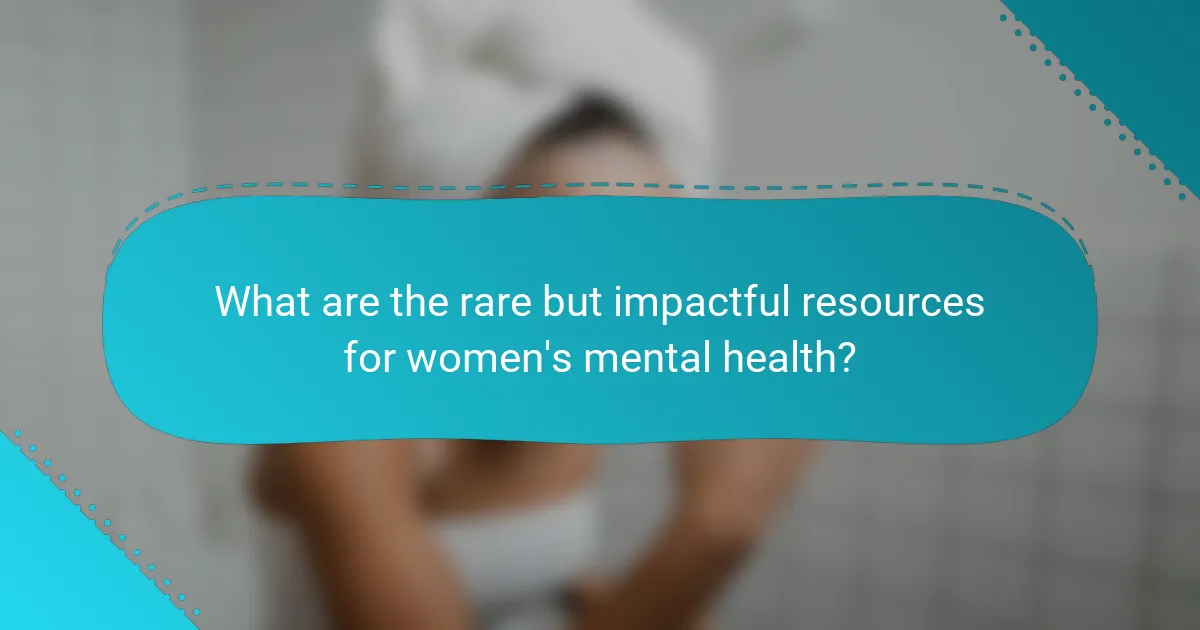
What are the rare but impactful resources for women’s mental health?
Rare but impactful resources for women’s mental health include specialized support groups, innovative therapy apps, and community-based programs. These resources often address unique challenges women face, such as postpartum depression or trauma recovery. Organizations like Postpartum Support International and the Women’s Mental Health Program offer tailored support. Additionally, apps like Sanvello and Headspace provide accessible mental health tools. Engaging in local women’s circles fosters connection and shared experiences, enhancing emotional well-being. These resources empower women to prioritize their mental health and build supportive networks.
How do specialized programs address unique challenges women face?
Specialized programs effectively address unique challenges women face by providing targeted mental health resources. These programs focus on issues like trauma, societal pressures, and work-life balance, offering tailored support networks. For example, women-only support groups create safe spaces for sharing experiences, enhancing emotional well-being. Additionally, self-care strategies, such as mindfulness and stress management techniques, are integrated into these programs, empowering women to prioritize their mental health. As a result, these resources foster resilience and promote positive mental health outcomes.
What innovative therapies are emerging for women’s mental health?
Emerging therapies for women’s mental health include innovative approaches such as digital mental health platforms, integrative care models, and trauma-informed therapy. These therapies focus on personalized treatment, accessibility, and holistic well-being. Digital platforms offer flexible support, enabling women to access resources anytime. Integrative care combines mental health with physical health services, addressing the whole person. Trauma-informed therapy emphasizes understanding the impact of trauma on mental health, fostering a safe space for healing. These advancements empower women by providing tailored resources and support networks.
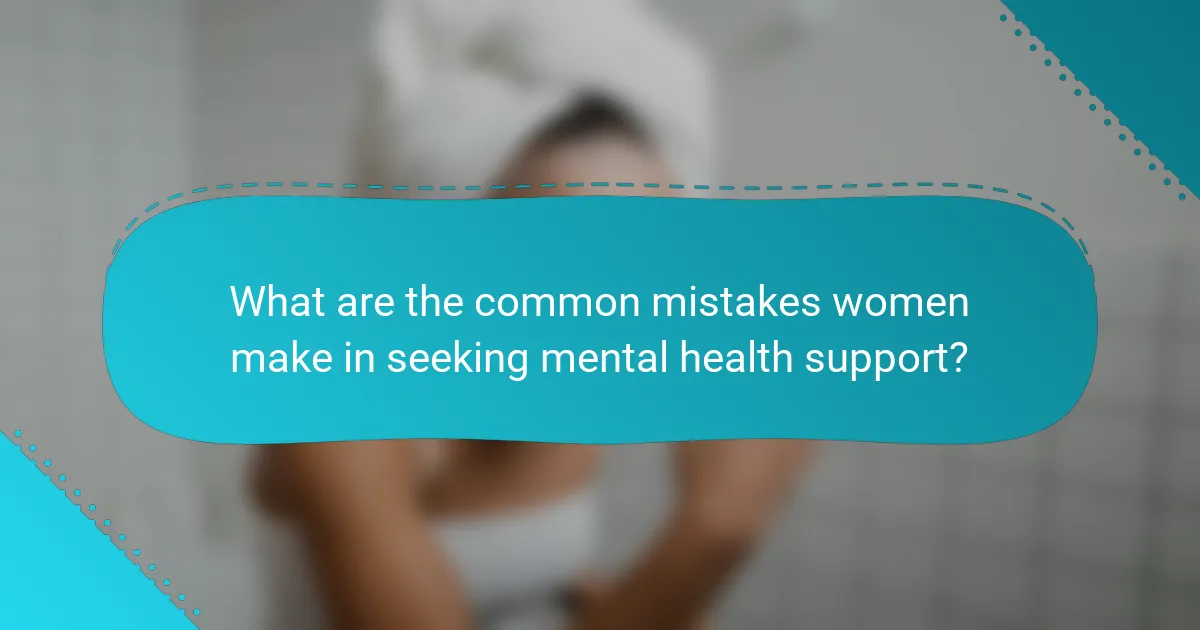
What are the common mistakes women make in seeking mental health support?
Women often overlook key aspects when seeking mental health support, which can hinder their progress. Common mistakes include underestimating the importance of self-advocacy, leading to inadequate communication with healthcare providers. Many women also hesitate to explore diverse resources, limiting their access to effective support networks. Additionally, neglecting self-care strategies can exacerbate mental health issues. Recognizing these pitfalls is crucial for women to empower themselves and enhance their mental well-being.
How can women optimize their mental health journeys?
Women can optimize their mental health journeys by utilizing targeted resources, support networks, and effective self-care strategies. Access to mental health resources tailored for women enhances emotional well-being and resilience.
Empowering tools include therapy apps, mindfulness programs, and educational workshops focused on women’s mental health issues. Support networks, such as women’s groups and online forums, provide community and shared experiences.
Self-care strategies like regular exercise, journaling, and meditation significantly improve mental health. Research indicates that women who engage in consistent self-care report lower stress levels and increased life satisfaction.
Incorporating these elements into daily routines fosters a proactive approach to mental health, promoting long-term well-being.
What expert insights can guide women in using mental health resources effectively?
Women can effectively use mental health resources by seeking tailored support networks, utilizing self-care strategies, and accessing expert guidance. Prioritize resources that address specific needs, such as therapy, community groups, and online platforms. Research shows that women benefit significantly from peer support and professional counseling, enhancing resilience and emotional well-being. Engaging in self-care practices, like mindfulness and exercise, further empowers women to manage stress and improve mental health outcomes.
